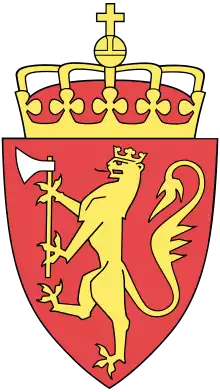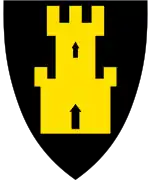Loppa
Loppa (Northern Sami: Láhppi and Kven: Lappea) is a municipality in Troms og Finnmark county, Norway. The administrative centre of the municipality is the village of Øksfjord. Other villages in Loppa include Andsnes, Bergsfjord, Langfjordhamn, Loppa, Nuvsvåg, Øksfjordbotn, Sandland, and Sør-Tverrfjord.
Loppa kommune
Láhpi suohkan Lappean komuuni | |
|---|---|
 View of the village of Øksfjord | |
 Flag 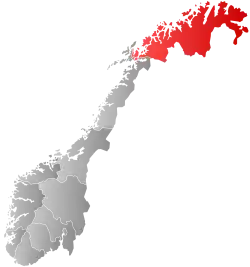 Troms og Finnmark within Norway | |
 Loppa within Troms og Finnmark | |
| Coordinates: 70°14′22″N 22°20′55″E | |
| Country | Norway |
| County | Troms og Finnmark |
| District | Vest-Finnmark |
| Established | 1 Jan 1838 |
| Administrative centre | Øksfjord |
| Government | |
| • Mayor (2019) | Stein Thomassen (Ap) |
| Area | |
| • Total | 688.88 km2 (265.98 sq mi) |
| • Land | 670.94 km2 (259.05 sq mi) |
| • Water | 17.94 km2 (6.93 sq mi) 2.6% |
| Area rank | 167 in Norway |
| Population (2020) | |
| • Total | 888 |
| • Rank | 342 in Norway |
| • Density | 1.3/km2 (3/sq mi) |
| • Change (10 years) | −18.3% |
| Demonym(s) | Loppværing[1] |
| Time zone | UTC+01:00 (CET) |
| • Summer (DST) | UTC+02:00 (CEST) |
| ISO 3166 code | NO-5432 |
| Official language form | Bokmål[2] |
| Website | loppa |
The 689-square-kilometre (266 sq mi) municipality is the 167th largest by area out of the 356 municipalities in Norway. Loppa is the 342nd most populous municipality in Norway with a population of 888. The municipality's population density is 1.3 inhabitants per square kilometre (3.4/sq mi) and its population has decreased by 18.3% over the previous 10-year period.[3][4]
Most people live in the village of Øksfjord, but smaller communities are spread out along the shores and islands, notably Nuvsvåg, Sandland, Bergsfjord, Brynilen, and the island of Loppa. This island was previously the administrative centre of the municipality (hence the name). There is no airport, but Øksfjord is a port of call for the Hurtigruten boats.
General information
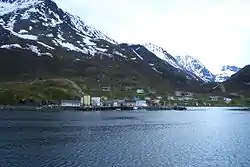
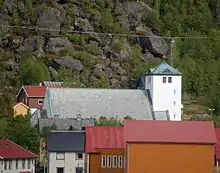

The municipality of Loppa was established on 1 January 1838 (see formannskapsdistrikt). In 1858, the northern part of Loppa on the island of Sørøya and most of Loppa on Stjernøya (population: 506) was separated to form the new municipality of Hasvik. This left Loppa with 801 residents. The borders of the municipality have not changed since that time.[5]
On 1 January 2020, the municipality became part of the newly formed Troms og Finnmark county. Previously, it had been part of the old Finnmark county.[6]
Name
The municipality is named after the island of Loppa (Old Norse: Loppa), since it was the former centre of the municipality and the first church (Loppa Church) was located there. The meaning of the name is uncertain, however it is mentioned to be of Norse origin.[7] Historically, the name was spelled Loppen.[8][9]
Coat of arms
The coat of arms is from modern times; they were granted on 19 December 1980. The arms show a great black cormorant on a gold background. The cormorant was chosen as a symbol since the municipality has several typical fishing villages which often attract cormorants.[10]
Churches
The Church of Norway has one parish (sokn) within the municipality of Loppa. It is part of the Alta prosti (deanery) in the Diocese of Nord-Hålogaland. In the medieval ages Loppa was its own parish, with traces after an old church in the fishing village of Yttervær, on the island Loppa.
| Parish (sokn) | Name | Location | Year built |
|---|---|---|---|
| Loppa | Bergsfjord Church | Bergsfjord | 1951 |
| Loppa Church | Loppa | 1953 | |
| Nuvsvåg Chapel | Nuvsvåg | 1961 | |
| Sandland Chapel | Sandland | 1971 | |
| Øksfjord Church | Øksfjord | 1954 |
Government
All municipalities in Norway, including Loppa, are responsible for primary education (through 10th grade), outpatient health services, senior citizen services, unemployment and other social services, zoning, economic development, and municipal roads. The municipality is governed by a municipal council of elected representatives, which in turn elect a mayor.[11] The municipality falls under the Alta District Court and the Hålogaland Court of Appeal.
Municipal council
The municipal council (Kommunestyre) of Loppa is made up of 15 representatives that are elected to four year terms. The party breakdown of the council is as follows:
| Party Name (in Norwegian) | Number of representatives | |
|---|---|---|
| Labour Party (Arbeiderpartiet) | 5 | |
| Conservative Party (Høyre) | 3 | |
| Centre Party (Senterpartiet) | 5 | |
| Socialist Left Party (Sosialistisk Venstreparti) | 2 | |
| Total number of members: | 15 | |
| Party Name (in Norwegian) | Number of representatives | |
|---|---|---|
| Labour Party (Arbeiderpartiet) | 6 | |
| Conservative Party (Høyre) | 5 | |
| Centre Party (Senterpartiet) | 2 | |
| Socialist Left Party (Sosialistisk Venstreparti) | 2 | |
| Total number of members: | 15 | |
| Party Name (in Norwegian) | Number of representatives | |
|---|---|---|
| Labour Party (Arbeiderpartiet) | 4 | |
| Conservative Party (Høyre) | 3 | |
| Coastal Party (Kystpartiet) | 6 | |
| Centre Party (Senterpartiet) | 1 | |
| Socialist Left Party (Sosialistisk Venstreparti) | 1 | |
| Total number of members: | 15 | |
| Party Name (in Norwegian) | Number of representatives | |
|---|---|---|
| Labour Party (Arbeiderpartiet) | 5 | |
| Conservative Party (Høyre) | 1 | |
| Coastal Party (Kystpartiet) | 5 | |
| Centre Party (Senterpartiet) | 2 | |
| Socialist Left Party (Sosialistisk Venstreparti) | 2 | |
| Total number of members: | 15 | |
| Party Name (in Norwegian) | Number of representatives | |
|---|---|---|
| Labour Party (Arbeiderpartiet) | 8 | |
| Coastal Party (Kystpartiet) | 5 | |
| Socialist Left Party (Sosialistisk Venstreparti) | 2 | |
| Total number of members: | 15 | |
| Party Name (in Norwegian) | Number of representatives | |
|---|---|---|
| Labour Party (Arbeiderpartiet) | 9 | |
| Centre Party (Senterpartiet) | 2 | |
| Socialist Left Party (Sosialistisk Venstreparti) | 1 | |
| Voting list for the Bergsfjord area (Valgliste for Bergsfjord krets) | 1 | |
| Loppa cross-party list (Loppa tverrpolitiske liste) | 2 | |
| Total number of members: | 15 | |
| Party Name (in Norwegian) | Number of representatives | |
|---|---|---|
| Labour Party (Arbeiderpartiet) | 9 | |
| Christian Democratic Party (Kristelig Folkeparti) | 1 | |
| Centre Party (Senterpartiet) | 3 | |
| Socialist Left Party (Sosialistisk Venstreparti) | 2 | |
| Loppa cross-party common list (Loppa tverrpolitiske fellesliste) | 4 | |
| Total number of members: | 19 | |
| Party Name (in Norwegian) | Number of representatives | |
|---|---|---|
| Labour Party (Arbeiderpartiet) | 7 | |
| Conservative Party (Høyre) | 2 | |
| Christian Democratic Party (Kristelig Folkeparti) | 1 | |
| Centre Party (Senterpartiet) | 2 | |
| Socialist Left Party (Sosialistisk Venstreparti) | 6 | |
| Nuvsvåg local list (Nuvsvåg bygdeliste) | 1 | |
| Total number of members: | 19 | |
| Party Name (in Norwegian) | Number of representatives | |
|---|---|---|
| Labour Party (Arbeiderpartiet) | 10 | |
| Conservative Party (Høyre) | 2 | |
| Christian Democratic Party (Kristelig Folkeparti) | 1 | |
| Centre Party (Senterpartiet) | 1 | |
| Socialist Left Party (Sosialistisk Venstreparti) | 3 | |
| Nuvsvåg local list (Nuvsvåg bygdeliste) | 2 | |
| Total number of members: | 19 | |
| Party Name (in Norwegian) | Number of representatives | |
|---|---|---|
| Labour Party (Arbeiderpartiet) | 9 | |
| Conservative Party (Høyre) | 2 | |
| Christian Democratic Party (Kristelig Folkeparti) | 1 | |
| Centre Party (Senterpartiet) | 1 | |
| Socialist Left Party (Sosialistisk Venstreparti) | 3 | |
| Nuvsvåg local list (Nuvsvåg bygdeliste) | 3 | |
| Total number of members: | 19 | |
| Party Name (in Norwegian) | Number of representatives | |
|---|---|---|
| Labour Party (Arbeiderpartiet) | 9 | |
| Conservative Party (Høyre) | 2 | |
| Christian Democratic Party (Kristelig Folkeparti) | 2 | |
| Centre Party (Senterpartiet) | 2 | |
| Socialist Left Party (Sosialistisk Venstreparti) | 2 | |
| Local list for Oksfjord og Oksfjordbotn (Kretsliste for Oksfjord og Oksfjordbotn) | 1 | |
| Local list for Bergsfjord (Kretsliste for Bergsfjord) | 1 | |
| Total number of members: | 19 | |
| Party Name (in Norwegian) | Number of representatives | |
|---|---|---|
| Labour Party (Arbeiderpartiet) | 11 | |
| Centre Party (Senterpartiet) | 1 | |
| Socialist Left Party (Sosialistisk Venstreparti) | 2 | |
| Fishermen and Workers' Non-party List (Fiskernes og Arbeidernes Upolitiske Liste) | 3 | |
| Voting List for the Bergsfjord area (Valgliste for Bergsfjord Krets) | 2 | |
| Total number of members: | 19 | |
| Party Name (in Norwegian) | Number of representatives | |
|---|---|---|
| Labour Party (Arbeiderpartiet) | 13 | |
| Joint List(s) of Non-Socialist Parties (Borgerlige Felleslister) | 2 | |
| Local List(s) (Lokale lister) | 4 | |
| Total number of members: | 19 | |
| Party Name (in Norwegian) | Number of representatives | |
|---|---|---|
| Labour Party (Arbeiderpartiet) | 9 | |
| Socialist People's Party (Sosialistisk Folkeparti) | 1 | |
| List of workers, fishermen, and small farmholders (Arbeidere, fiskere, småbrukere liste) | 4 | |
| Joint List(s) of Non-Socialist Parties (Borgerlige Felleslister) | 4 | |
| Local List(s) (Lokale lister) | 1 | |
| Total number of members: | 19 | |
| Party Name (in Norwegian) | Number of representatives | |
|---|---|---|
| Labour Party (Arbeiderpartiet) | 7 | |
| List of workers, fishermen, and small farmholders (Arbeidere, fiskere, småbrukere liste) | 5 | |
| Joint List(s) of Non-Socialist Parties (Borgerlige Felleslister) | 4 | |
| Local List(s) (Lokale lister) | 3 | |
| Total number of members: | 19 | |
| Party Name (in Norwegian) | Number of representatives | |
|---|---|---|
| Labour Party (Arbeiderpartiet) | 9 | |
| Local List(s) (Lokale lister) | 10 | |
| Total number of members: | 19 | |
| Party Name (in Norwegian) | Number of representatives | |
|---|---|---|
| Labour Party (Arbeiderpartiet) | 5 | |
| Communist Party (Kommunistiske Parti) | 1 | |
| List of workers, fishermen, and small farmholders (Arbeidere, fiskere, småbrukere liste) | 5 | |
| Local List(s) (Lokale lister) | 8 | |
| Total number of members: | 19 | |
| Party Name (in Norwegian) | Number of representatives | |
|---|---|---|
| Labour Party (Arbeiderpartiet) | 9 | |
| List of workers, fishermen, and small farmholders (Arbeidere, fiskere, småbrukere liste) | 3 | |
| Joint List(s) of Non-Socialist Parties (Borgerlige Felleslister) | 4 | |
| Total number of members: | 16 | |
| Party Name (in Norwegian) | Number of representatives | |
|---|---|---|
| Labour Party (Arbeiderpartiet) | 8 | |
| Communist Party (Kommunistiske Parti) | 1 | |
| List of workers, fishermen, and small farmholders (Arbeidere, fiskere, småbrukere liste) | 7 | |
| Total number of members: | 16 | |
| Party Name (in Norwegian) | Number of representatives | |
|---|---|---|
| Labour Party (Arbeiderpartiet) | 9 | |
| Joint List(s) of Non-Socialist Parties (Borgerlige Felleslister) | 7 | |
| Total number of members: | 16 | |
| Party Name (in Norwegian) | Number of representatives | |
|---|---|---|
| Labour Party (Arbeiderpartiet) | 6 | |
| List of workers, fishermen, and small farmholders (Arbeidere, fiskere, småbrukere liste) | 1 | |
| Joint List(s) of Non-Socialist Parties (Borgerlige Felleslister) | 9 | |
| Total number of members: | 16 | |
History
The area of Loppa is suggested to have been inhabited since the Mesolithic times with traces after settlement and scattered findings in both Nuvsvåg, Øksfjord, Sandland, Loppa, Silda and Bergsfjord. The activity of fishing and whaling in the municipality seems to have its origins from ancient times.[30]
Roman Age
Little is known of this period historically and archaeologically in this area. However the discovering of a Roman Age longhouse from 120 AD,[31] at the island of Loppa shows the earliest signs of settlement in the Early Iron Age. Perhaps was this the very beginning of Norse taxation of the Sami peoples in the area and the interaction between the two peoples of trade and commerce in fishing and the industry of the hunting of maritime mammals.[32][33] The longhouse is also one of the oldest one ever discovered in Northern Norway.
Viking Age
In 1962 a rich female Viking Age grave was discovered on the island of Loppa. It contained luxurious personal objects such as tortoise brooches, a round brooch in the Oseberg style, a whalebone plaque, beads, knife, scissor and an arrowhead. The female grave was dubbed "The Queens Grave" due to the manner in which she was buried. However she was most likely not a queen but a very important person indeed on Viking Age Loppa. Perhaps a housewife of a local chieftain? The wealth of the grave reflects that of the Norse elite's presence in the area. The burial was dated to the 9th century AD.[31][34][35]
In 1964 a longhouse from Viking Age was also discovered dated to the end of the 8th century AD. Several other buildings and boathouses was also discovered and dated to the same period as the longhouse and the rich female grave. There is also several burials from Iron Age on the island, where the biggest a burial cairn with the size of 13 meters in diameter. The amount of Iron Age burials and houses suggests that of a more permanent Norse settlement.[35]
Middle Ages
In Middle Ages, the hunting and the production of oil from marine mammals seems to stop, and fishing becomes more important. Along the coast of Northern Norway we see so called farm mounds of ancient settlements, and at Loppa there are at least 6 farm mounds spread out on the island of Loppa, Silda and at mainland Andsnes. However, the farm mounds of Northern Norway seem to have their upbringing already in Early Iron Age, suggesting that fishing was already a commercial trade before the Middle Ages. On the island of Loppa one of the farm mounds was dated to the 1100's AD, with a church site close by. This suggests that Loppa was its own parish already in the Middle Ages.[35][36]
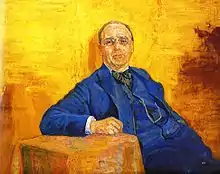
Notable people
- Hans E. Kinck (1865 in Øksfjord – 1926) a Norwegian author and philologist who wrote novels, short stories, dramas, and essays
- Harald Nicolai Samuelsberg (1911 in Loppa – 1986) a Norwegian politician & Mayor of Loppa
- Hallgeir Pedersen (born 1973) a Norwegian jazz guitarist, raised in Øksfjord
- Magnus Andersen (born 1986 in Øksfjord) a Norwegian football midfielder with over 300 club caps
Geography
Loppa is the westernmost municipality of Finnmark and it faces the open stretch of the Norwegian Sea called Lopphavet, and it is mostly coastal with fjords and islands under the gigantic snowcap of the Øksfjordjøkelen glacier. The municipality includes most of the peninsula between the Kvænangen and the Altafjorden. There are also several islands in the municipality, notably Loppa, Silda, and part of Stjernøya. The mountains Lopptinden and Svartfjellet both lie in the municipality along with the glaciers Langfjordjøkelen, Øksfjordjøkelen, and Svartfjelljøkelen.
Climate
| Climate data for Øksfjord | |||||||||||||
|---|---|---|---|---|---|---|---|---|---|---|---|---|---|
| Month | Jan | Feb | Mar | Apr | May | Jun | Jul | Aug | Sep | Oct | Nov | Dec | Year |
| Daily mean °C (°F) | −3.7 (25.3) |
−3.5 (25.7) |
−2.1 (28.2) |
0.7 (33.3) |
4.8 (40.6) |
8.9 (48.0) |
12.1 (53.8) |
11.3 (52.3) |
7.7 (45.9) |
3.5 (38.3) |
−0.2 (31.6) |
−2.6 (27.3) |
3.1 (37.6) |
| Average precipitation mm (inches) | 73 (2.9) |
67 (2.6) |
57 (2.2) |
52 (2.0) |
46 (1.8) |
52 (2.0) |
59 (2.3) |
71 (2.8) |
80 (3.1) |
105 (4.1) |
82 (3.2) |
86 (3.4) |
830 (32.7) |
| Source: Norwegian Meteorological Institute[37] | |||||||||||||
References
- "Navn på steder og personer: Innbyggjarnamn" (in Norwegian). Språkrådet.
- "Forskrift om målvedtak i kommunar og fylkeskommunar" (in Norwegian). Lovdata.no.
- Statistisk sentralbyrå (2020). "Table: 06913: Population 1 January and population changes during the calendar year (M)" (in Norwegian).
- Statistisk sentralbyrå (2020). "09280: Area of land and fresh water (km²) (M)" (in Norwegian).
- Jukvam, Dag (1999). "Historisk oversikt over endringer i kommune- og fylkesinndelingen" (PDF) (in Norwegian). Statistisk sentralbyrå.
- Mæhlum, Lars, ed. (2019-12-24). "Troms og Finnmark". Store norske leksikon (in Norwegian). Kunnskapsforlaget. Retrieved 2019-12-26.
- Bratrein, Håvard Dahl (2018). Høvding, Jarl, Konge. Nord-Norges politiske historie i vikingtid, ei annerledes fortelling. Tromsø Museums Skrifter.
- Rygh, Oluf (1924). Norske gaardnavne: Finmarkens amt (in Norwegian) (18 ed.). Kristiania, Norge: W. C. Fabritius & sønners bogtrikkeri. pp. 93–94.
- Store norske leksikon. "Loppa" (in Norwegian). Retrieved 2013-01-09.
- "Civic heraldry of Norway - Norske Kommunevåpen". Heraldry of the World. Retrieved 2017-08-20.
- Hansen, Tore, ed. (2016-05-12). "kommunestyre". Store norske leksikon (in Norwegian). Kunnskapsforlaget. Retrieved 2018-06-05.
- "Tall for Norge: Kommunestyrevalg 2019 - Troms og Finnmark". Valg Direktoratet. Retrieved 2019-10-23.
- "Table: 04813: Members of the local councils, by party/electoral list at the Municipal Council election (M)" (in Norwegian). Statistics Norway.
- "Tall for Norge: Kommunestyrevalg 2011 - Finnmark". Valg Direktoratet. Retrieved 2019-10-23.
- "Kommunestyrevalget 1995" (PDF) (in Norwegian). Oslo-Kongsvinger: Statistisk sentralbyrå. 1996. Retrieved 2020-03-18.
- "Kommunestyrevalget 1991" (PDF) (in Norwegian). Oslo-Kongsvinger: Statistisk sentralbyrå. 1993. Retrieved 2020-03-18.
- "Kommunestyrevalget 1987" (PDF) (in Norwegian). Oslo-Kongsvinger: Statistisk sentralbyrå. 1988. Retrieved 2020-03-18.
- "Kommunestyrevalget 1983" (PDF) (in Norwegian). Oslo-Kongsvinger: Statistisk sentralbyrå. 1984. Retrieved 2020-03-18.
- "Kommunestyrevalget 1979" (PDF) (in Norwegian). Oslo: Statistisk sentralbyrå. 1979. Retrieved 2020-03-18.
- "Kommunevalgene 1975" (PDF) (in Norwegian). Oslo: Statistisk sentralbyrå. 1977. Retrieved 2020-03-18.
- "Kommunevalgene 1972" (PDF) (in Norwegian). Oslo: Statistisk sentralbyrå. 1973. Retrieved 2020-03-18.
- "Kommunevalgene 1967" (PDF) (in Norwegian). Oslo: Statistisk sentralbyrå. 1967. Retrieved 2020-03-18.
- "Kommunevalgene 1963" (PDF) (in Norwegian). Oslo: Statistisk sentralbyrå. 1964. Retrieved 2020-03-18.
- "Kommunevalgene og Ordførervalgene 1959" (PDF) (in Norwegian). Oslo: Statistisk sentralbyrå. 1960. Retrieved 2020-03-18.
- "Kommunevalgene og Ordførervalgene 1955" (PDF) (in Norwegian). Oslo: Statistisk sentralbyrå. 1957. Retrieved 2020-03-18.
- "Kommunevalgene og Ordførervalgene 1951" (PDF) (in Norwegian). Oslo: Statistisk sentralbyrå. 1952. Retrieved 2020-03-18.
- "Kommunevalgene og Ordførervalgene 1947" (PDF) (in Norwegian). Oslo: Statistisk sentralbyrå. 1948. Retrieved 2020-03-18.
- "Kommunevalgene og Ordførervalgene 1945" (PDF) (in Norwegian). Oslo: Statistisk sentralbyrå. 1947. Retrieved 2020-03-18.
- "Kommunevalgene og Ordførervalgene 1937" (PDF) (in Norwegian). Oslo: Statistisk sentralbyrå. 1938. Retrieved 2020-03-18.
- "Archaeological database Askeladden".
- Bratrein, Håvard Dahl (1996). Ottar Tidsskrift. Tromsø Museum.
- Ellingsen, Gøran Hálfdanarson (2017). Loppa - An Iron Age settlement in the periphery of Hálogaland (Thesis) (in Norwegian).
- Henriksen, Jørn Erik (1995). "Hellegropene, fornminner fra en funntom periode". Academia.edu.
- Storli, Inger (2006). Hålogaland før rikssamlingen. Institutt for sammenliknende forskning.
- Bratrein, Håvard Dahl. Feltrapport fra 1994.
- Bruun, Inga Malene (2009). Kulturminneregistrering i gamle fiskevær. Tromsø Museum.
- "eKlima Web Portal". Norwegian Meteorological Institute. Archived from the original on 2004-06-14.
External links
 Media related to Loppa at Wikimedia Commons
Media related to Loppa at Wikimedia Commons- Municipal fact sheet from Statistics Norway (in Norwegian)

